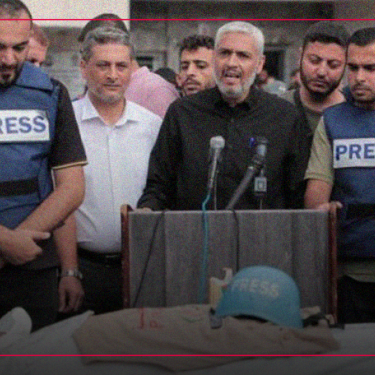Israel suffocating journalism in Gaza

With journalists killed or wounded, media premises destroyed, Internet shutdowns and the threatened censorship of the Al Jazeera TV news channel, Israel has been steadily suppressing news reporting in the Gaza Strip for nearly two weeks, says Reporters Without Borders (RSF).
The Israelis are close to imposing an all-out media blackout in Gaza. General measures such as the long-imposed and recently reinforced blockade and the forced displacement of civilians in the past few days are affecting local journalists and their families. At the same time, news media and journalists are also being specifically endangered in various ways.
During the “bloody week” following the massacre of Israeli civilians by Hamas, ten journalists were killed in connection with their work – eight of them in Gaza and most if not all of them as a result of Israeli bombardments. The latest victim is Mohammad Baalouche, the director of the Palestine Today TV channel, who was killed by a targeted strike on his home on 17 October, according to the information obtained by RSF.
In addition to the ten journalists killed while covering the war, nine others have been killed in their homes in Gaza as a result of Israeli bombardments and airstrikes. RSF is investigating whether they were targeted because of their work.
The suppression of journalism is also taking other forms. Since 7 October, many media outlets have been entirely or partially destroyed in Gaza by Israeli air strikes. The Palestinian Press Syndicate says as many as 50. Most of the 24 radio stations broadcasting over the air or online – which are among the main news sources in the Gaza Strip – have been silenced by the airstrikes and bombardments or by the Israeli blockade, which prevents them from getting fuel.
On October 19, a strike near the Nasser hospital in Khan Younès destroyed a temporary tented newsroom sheltering teams from the BBC, Reuters, Al Jazeera, AFP and local news agencies, without causing any injuries.
Growing obstacles to reporting
While constantly risking their lives, at least 50 journalists – according to RSF estimates – have had to rush to evacuate their homes in Gaza City in recent days as a result of Israeli evacuation orders. They had to abandon reporting equipment, documents and protective gear in the course of this forced displacement.
“I evacuated my home in Gaza City last night,” RSF was finally told by its correspondent after she had spent more than six hours without a network connection on 14 October, a week into the conflict. “I'm having trouble talking to you. We barely have any Internet here and we can't charge our phones. I am doing my best to gather information. We live in fear, it's unbearable. This is not the first war I’ve covered in Gaza, but I have never seen anything like this.”
The pressure on journalists covering the situation in the Gaza Strip, even those covering it from outside the enclave, has increased since 7 October. At least one journalist has been arrested by Israeli occupation forces in the West Bank because of his coverage of the war in Gaza. In Jerusalem, Al Araby TV correspondent Ahmad Darwasha was threatened and insulted by a police officer during a live broadcast, while three BBC journalists were held at gunpoint by Israeli police in Tel Aviv.
“So that the outside world can receive freely reported and reliable coverage of the situation, journalists must be able to work. But journalism is becoming more dangerous every the day. For nearly two weeks, the Israeli armed forces have been doing everything possible to prevent the dissemination of images. We condemn the media blackout that Israel is trying to impose. Journalism is the antidote to the disinformation that is spreading with particular strength with regard to this region.”
Meanwhile, Al Jazeera will probably soon become inaccessible within Israel. In the “emergency regulations” that are due to be adopted on Sunday, Israeli government ministers plan to censor the Qatari broadcaster, which is one of the main sources of international TV coverage of the war in Gaza and its repercussions.
